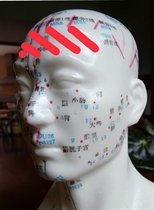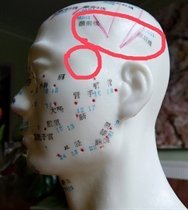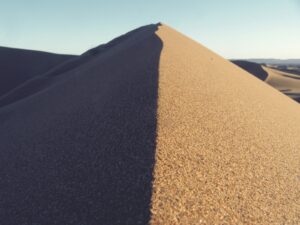Subscribe to the Newsletter
If you are interested in understanding how Traditional Chinese Medicine can improve your life sign up to my newsletter for the latest updates.

Key Learning Points
Migraine and Headache problems affect eight million people in the UK alone. That’s 12% of us. It’s a worldwide problem, more common than asthma, diabetes and epilepsy combined. What does Chinese medicine have to say about it?
Towards the bottom of this page we’ve described some kinds of head pain and suggested possible syndromes for them.
However, just before that – near the bottom of the page – is a copy of a letter to the editor of the Journal of American Medical Association. This respected journal carried an article on the prevention of migraine which mentioned a number of treatments for which there is no evidence and failed to mention acupuncture, for which there is abundant positive evidence!
Although they can be very severe, incapacitating people for days on end, migraines are still just one form of headache, and headaches have many causes in Chinese medicine.
Your head is where, in Chinese medicine, your Yang energies concentrate and collect. All your Yang acupuncture channels meet here, and if clear Yang energy ascends properly, you will have good hearing, good vision, a good sense of smell and good taste-buds. You will also be able to think clearly.
Too much Yang, however, can makes your head feel like bursting!
Conversely, when Yin forms of energy, such as phlegm, catarrh, mucus and coldness, get stuck in the head, you feel confused, heavy-headed and slow.
However, your head itself and its contents (eg your brain) are said to be ‘ruled’ by your Kidneys (capital ‘K’ denotes the Kidney Zangfu or energy organ). Kidney deficiency causes many long-term deep-seated problems.
Also, your Blood (capital B) must flow smoothly through your head. As with orthodox medicine, Blood is a big subject in Chinese medicine. That link to Blood tells you more about the ideas behind it.
From the above alone, you will understand that in Chinese medicine migraine and headache problems arise from :
Internal means the problem arose from something already there, although it may have in turn been prompted by something from outside.
External means, in Chinese medicine, the environment and weather are seen as the cause – although there would have had to be susceptibility to it before External factors take hold.

Too much Yang pushing up and collecting in your head can come from various internal problems:


So-called external conditions causing migraine and headache arise from the weather, the climate and sudden changes in temperature or conditions that we cannot adjust to fast enough.
These include, for some people, air-conditioning and central heating, (together with the dust and other allergens they may carry) when the body is hit by a sudden change in ambient temperature.
Usually there is a ‘wind’ as well. This ‘wind’ could come about from driving with the window open in summer, enjoying the breeze into the car as you speed along. For some people, this is enough to set off a headache.
Incidentally, it may go further than mere migraine or headache! I have seen many patients who got facial paralysis (Bell’s Palsy) from exposure to the weather or the wind.
Where you feel the migraine and headache says a lot about which acupuncture channels are affected.
For any kind of treatment in Chinese medicine, the channel (or meridian) where the pain occurs, or along which it travels, makes an enormous difference to the treatment outcome.
All the Yang channels (ie Small Intestine, Bladder, Three Heater, Gallbladder, Stomach and Large Intestine meridians) pass over and through the head, plus the Liver and Kidney channels, which come up inside it.
Other zang-fu reach up to the head internally, such as the Heart which has a strong kinship with the tongue, and the Lungs which go to the throat, for instance. But these are less common in headache, let alone migraine.
So migraine and headache problems have to be looked at from not just the location of the pain but also the syndrome concerned, interior or exterior as it may be.
Forehead or Frontal PainThis area is crossed by the Stomach and Gallbladder channels. Pain here often comes from Stomach Qi problems (eg Stomach Heat) or Blood deficiency, perhaps from weak Stomach Qi or from an inadequate diet or from poor eating habits.
|  |
 | Occiput Pain Area |
Lesser Yang: Gallbladder and Three-Heater areasThese migraine and headache pain areas beside the eyes, or on the side of the head above and to the front of the ears, are crossed by the Gallbladder and Three-Heater channels, which account for most problems here. |  |
 | Liver Yang Rising pain areaThe side of the head shown relates usually to the Liver Yang rising pain syndrome. This is probably the most common area for migraine. It usually affects only one side of the head, and often derives from some deficiency in either Liver Yin or Liver Blood, and/or sometimes Kidney Yin or Yang. |
Liver Blood DeficiencyFor pain at the Vertex, the cause is usually Liver Blood deficiency. This sometimes comes with dizziness and visual problems |  |
 | Pain behind the eyesPain and problems behind or within the eyes come usually, in fact nearly always, from either Liver Blood deficiency (dull ache including loss of vision) or from the throbbing, even numbing pain of Liver Yang ascending. |
Two possibilities here: either all the (Yang) channels are disrupted by the invasion of Wind-Heat or, if the pain is more like a deep ache, it will probably be from Kidney deficiency.
The location tells you which channels or meridians are affected.
The symptoms tell you which syndrome is involved.
In migraine, syndromes are mostly what are called ‘full’ rather than ’empty’. As sufferers grow older, they tend also to get deficiency syndromes as well. After some years, there can be quite a mix.

Stay in Touch!
No spam, only notifications about new articles and updates.

Book a Video consultation if you want to know more about your symptoms
Earlier in the day and the more acute, the more likely it is to be from ‘fullness‘ or ‘excess‘.
The more suddenly it comes, the more likely it is to be from Wind.
The more of an ache it is, better for rest, the more likely it is to be a deficient-type headache, such as Qi deficiency or Kidney deficiency.
If it improves from exercise and good sex, it’s probably from Qi stagnation. Read more about this interesting syndrome in my book.
See the letter below for a summary of ‘orthodox’ treatments but in terms of treatment using Chinese medicine, the following are frequently used by practitioners:
For research on using acupuncture for migraine and headache click here.
You may also be interested in the following, a copy of a letter sent to the editor of the Journal of the American Medical Association which had
“carried an article on the prevention of migraine. Although this was billed as being a summary of information about treatment options that are endorsed by the US government this didn’t appear to be true, and moreover acupuncture was missing.
Acupuncture is one of the very best treatments for preventing migraines, and is even recommended by NICE for use in the NHS, so we thought that it was worth writing a letter to the editor. In the event, they chose not to publish it but we reproduce it below, to give you an idea of the various arguments and to encourage others to take up their pens when they think there is a case to answer.”
The Clinical Review on the “Prevention of Migraine”: Acupuncture is Conspicuous by its Inexplicable Absence“We read your article on the prevention of migraines with great interest but couldn’t tease out how the authors chose which treatments to include (see reference 1, below). The review mentions pharmaceutical, nutraceutical and physical approaches, both FDA approved and off-label, effective and ineffective, but fails to mention acupuncture, which has stronger evidence than most of those recommended. It would have been logical to consider only FDA-approved or guideline-endorsed interventions but most of those mentioned don’t meet these criteria: most beta blockers, the antidepressants, ACE inhibitors, NSAIDs, statins, and supplements are not FDA-approved for migraine prevention and constitute off-label prescribing. By contrast, the FDA now recommends that doctors learn about acupuncture as a safe and effective pain treatment in order to reduce prescribing of opioids (see reference 2 below) and acupuncture is recommended in the NICE clinical guidelines for the prevention of migraine. The only drugs recommended are topiramate, propanolol and gabapentin (reference 3). The vast majority of treatmentsThe vast majority of treatments mentioned are poorly tolerated and frequently discontinued due to unpalatable side-effects. Many are not considered safe during pregnancy. Acupuncture is considered a very safe treatment. Some of the included treatments have only the flimsiest of evidence supporting a recommendation, for example the combination of simvastatin plus vitamin D. On the other hand, the most recent Cochrane systematic review of acupuncture for migraine prophylaxis includes 4,985 participants in 25 randomised controlled trials, firmly placing it amongst the most well studied treatments. Finally, one could have focused on effectiveness or efficacy, the logical choice for educating clinicians on how best to help their patients. But some treatments mentioned have zero evidence of efficacy, for example nortriptyline (reference 4). In stark contrast, strong peer-reviewed evidence supports the use of acupuncture as effective, efficacious and safe for migraine prophylaxis. In the most recent Cochrane review acupuncture is superior to no acupuncture (acute treatment only or routine care) and even to the diluted dose of acupuncture that masquerades as placebo (see reference 5). Of most clinical interest, though, is that acupuncture was more effective than prophylactic drugs (metoprolol, flunarizine and others), and with fewer adverse events. In summary, a review of treatments for migraine prophylaxis that fails to mention one of the best-studied, most effective and best-tolerated does a great disservice to patients by misinforming clinicians. If there was a valid reason for this omission, we would be interested to hear it. Mark Bovey (Research Manager, British Acupuncture Council ) Mel Hopper Koppelman (Director of Evidence Based Acupuncture) References1. Abramowicz M, Zuccotti G, Pflomm J-M, eds. Prevention of Migraine. JAMA. 2017;317(21):2230- 2231. doi:10.1001/jama.2017.1680. 2. FDA. FDA Education Blueprint for Health Care Providers Involved in the Management or Support of Patients with Pain. 2017:1-10. https://www.fda.gov/Drugs/NewsEvents/ucm553931.htm. 3. NICE National Institute for Health and Care Excellence. CG150. Headaches in Over 12s: Diagnosis and Management. NICE; 2012. https://www.nice.org.uk/guidance/cg150. 4. Domingues RB, Silva ALPD, Domingues SA, Aquino CCH, Kuster GW. A double-blind randomized controlled trial of low doses of propranolol, nortriptyline, and the combination of propranolol and nortriptyline for the preventive treatment of migraine. Arq Neuropsiquiatr. 2009;67(4):973-977. 5. Linde K, Allais G, Brinkhaus B, et al. Acupuncture for the Prevention of Episodic Migraine. (Linde K, ed.). Chichester, UK: John Wiley & Sons, Ltd; 2016. doi:10.1002/14651858.CD001218.pub3.” |
Probably caused by Liver Yang Rising. Many migraines fall into this category. (Acupuncture very good for this.)
Often associated with nervous or emotional stress or tension, digestive disturbances, eructations, flatulence, a sensation of distension in the abdomen (real or imagined), and stools that are make of little bits, like rabbit or sheep dung. These people often take deep sighs. They are usually better for exercise, unless the headache is really bad. Almost certainly this would be classified as due to what is called Liver Qi Stagnation. Acupuncture is brilliant for this.
If there is an ongoing emotional problem, it needs to be sorted out, or the condition will recur.
The whole head can feel as if in a fog or wrapped in cotton wool. The sensation is such that it becomes hard to think. Often comes with catarrh, sinus problems, reduced appetite and/or nausea. diagnosis is almost certainly Dampness from Spleen Deficiency. Acupuncture and Chinese Herbs work well here.
this is described as Phlegm syndrome. A disease called Meniere’s syndrome often contains Phlegm as part of its picture. Acupuncture works well for this, but is even more effective if used with Chinese Herbs. Phlegm headaches take longer to treat than most other types.)
… with tired eyes, worse for work, better for rest, gentle pressure on the head, and sleep. Pain here is not acute, just ‘dull’ in nature. This is caused by a sub-category of Spleen Deficiency, sometimes also with Kidney deficiency. These patients in particular need to rest often: to take a nap after lunch, to go to bed early, and to eat good food regularly and slowly. They should avoid sexual activities until they are better. Don’t overwork!
People with this kind of ‘tired headache’ sometimes say that they feel better after caffeine, (unless it turns out that they have Blood or Yin deficiency too). Unfortunately any amelioration is short-lived, after which they feel dreadful. So we advise them to avoid caffeine and other stimulants! Acupuncture or Chinese Herbs: both work well.
Diagnosis: What is called ‘Stagnant food’. Acupuncture, Chinese Herbs. Often need advice on diet and eating habits.
… that whilst short-lived is severe. These symptoms usually accompany a general feeling of malaise, and a feeling of coldness (in spite of possibly having a fever), with shivering, with sneezing, blocked nose and dislike of cold. Diagnosis: Wind-Cold.
If treated early, acupuncture usually sorts this out, likewise Chinese Herbs.

Also fever, with dislike of cold, some thirst, nose has yellow mucous, sore throat, sometimes swollen glands, eyes red. Wind-Heat. Acupuncture is excellent for this, if caught early. Herbs work well too.
May also have abdominal pain and, in women, painful periods. Often skin colour seems darker than it should be.
Diagnosis: Blood Stagnation. This kind of pain frequently first starts some time after an accident. It can also occur in women, or old persons, who have what is called Deficiency of Blood. However, it has a number of causes. (Chronic Blood stagnation headaches can be difficult to treat, especially in older persons. Acupuncture can help though Chinese Herbs are probably best. Expect treatment to take time, especially in old people.)
In Real Life syndromes usually, or often, come together.
For example, someone may have both Liver Yang Rising, Deficiency of Blood, Spleen or Kidney, and Liver Qi Stagnation. Stagnant Blood headaches often come with Blood Deficiency, and in old people, Kidney deficiency too. Some of these combinations are harder to treat than others: such a mix of syndromes takes longer to cure.
(This is only a small selection.)

This Introductory Chinese medicine course introduces you to the amazing thinking behind this ancient medicine, now increasingly in demand.

The Scottish College for Chinese medicine provides introductory courses for all, explaining Chinese medicine and its cultural background.

Master Tung’s acupuncture is a hidden treasure, lost to China but recovered in Taiwan from where it spread round the world.

Knee pain has five main causes. It’s certainly worth trying acupuncture before you resort to surgery!
Subscribe to the Newsletter
If you are interested in understanding how Traditional Chinese Medicine can improve your life sign up to my newsletter for the latest updates.
Subscribe to the Newsletter
If you are interested in understanding how Traditional Chinese Medicine can improve your life sign up to my newsletter for the latest updates.